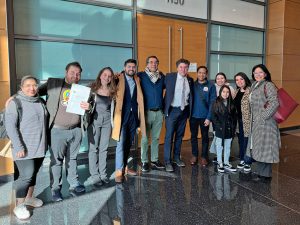A few times participants in my trainings have told me that I am really good at listening and synthesizing information.
I remember once facilitating a day-long retreat for a volunteer activist group that wanted to set plans for the coming year.
Someone stepped out just as an important discussion was happening about how they would make decisions moving forward.
When they came back they had a puzzled look on their face so I began to summarize each comment that had been made while they were away.
Nearly everyone in the group had spoken so I summarized each of the points made by the other 5 of the participants in order.
“That was impressive,” one of the participants said. And the conversation continued.

Interpreting Taught Me
This is not something that came naturally to me. I learned this skill in synthesis when I worked as a Spanish-English interpreter.
When I lived in Nicaragua I often interpreted for presenters from Spanish into English for presentations that were 30 minutes to an hour long.
At first, I found it immensely stressful and I got so nervous that my mind would go blank. Even though I understood what they said they would complete a few sentences and I could hardly recall a single word they said.
To calm my nerves I spent time studying methodologies for consecutive interpreting and turned my notes into a handbook (that was in 2012, if you want to know how long I’ve been creating how-to guides).
What I found were the secrets that interpreters use to memorize long strings of information that I believe will help you become a better facilitator.

How to Be a Better Listener
In contrast to being a consecutive interpreter, as a facilitator, you rarely have to repeat back word-for-word what you hear. Whew!
But from time to time it is extremely helpful to summarize some of the patterns that emerge from an important discussion and depending on the length of the discussion and the size of the group, this can be difficult to do.
So here are the techniques that I learned as an interpreter, that you can use as a facilitator to do this effectively.
- Chunk Ideas
- When someone makes a contribution don’t try to memorize the whole comment. Instead, grab onto one word or phrase that summarizes the idea. Interpreters call this “chunking.” For example: “It’s easy to resort to presenting instead of involving the group in dialogue through activities.” Just remember “presenting and dialogue.”
- When someone makes a contribution don’t try to memorize the whole comment. Instead, grab onto one word or phrase that summarizes the idea. Interpreters call this “chunking.” For example: “It’s easy to resort to presenting instead of involving the group in dialogue through activities.” Just remember “presenting and dialogue.”
- Repeat It Back in Your Head
- Use every natural pause that happens during the dialogue to repeat back previous “chunked” ideas in your head. (Note: this also is great for memorizing people’s names)
- Use every natural pause that happens during the dialogue to repeat back previous “chunked” ideas in your head. (Note: this also is great for memorizing people’s names)
- Ask For Confirmation
- Once the dialogue concludes, form your chunked phrases into sentences expound on the idea then ask the group, “What would you add?” This gives people a chance to correct you if they felt misrepresented or, far more often, add something they realized was missing from the conversation so far.

Putting It Into Practice
This may seem like an immensely complicated skillset, but in my experience doing this just half the time will leave you way better off than you would otherwise be.
As a facilitator, you have great responsibility and losing track of the conversation can drain valuable time and energy that could otherwise be spent advancing the cause.
The good news is that you can practice without facilitating at all. Simply pull up your favorite podcast (best to use one that has dialogue rather than monologue), and pause every 20-30 seconds to practice using the techniques above.
With more practice, you can take your listening and synthesis skills to the next level and be an even more effective facilitator.
Did you find this helpful? Let us know in the comments below.





